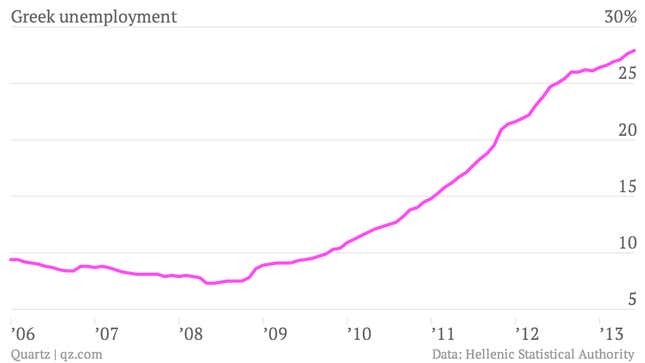Another month, another atrocious unemployment number for Greece. Unemployment climbed to 27.9% in June according to the latest numbers from the Hellenic Statistical Authority. That’s up from 27.6% in May. Last June unemployment was 24.6%. The number of jobless Greeks rose to more than 1.4 million for the first time. (The total population is a bit more than 11 million.)

At this point, everybody knows how Greece got here. With its entry into the eurozone, Greece took full advantage of plunging borrowing costs to binge on debt, much of which was used to support a bloated government sector. When the markets turned on the country and cut off its access to borrowing, the European powers-that-be felt forced to bail the nation out, but they demanded painful reforms in return for continually cutting checks.
While perhaps justified—at least from the perspective of lenders—austerity has been excruciating for the Greek public. Suicides have surged by 45%, according to one charity. The head of another aid group, Oxfam—founded in 1942 to help deal with a famine in Greece—says that the Hellenic Republic is again in a “terrible state.”
What’s important to note is that all of this pain isn’t really helping the debt situation. As we’ve pointed out before, Greece’s debt load continues to climb, quite predictably, as the deeply damaged economy can’t generate the tax revenue it needs to whittle away at its debt. As a result, Greece has had to go back to European lenders repeatedly for more help, which those writing the checks freely admit.
In a worst case scenario, the extreme pain being felt by the Greek population translates into more radical political voices, a trend that’s already underway. That could set the stage for an eventual Greek exit from the monetary union. But Greeks shouldn’t kid themselves that the so called Grexit would be any easy answer to their problems. A return to the drachma would translate into widespread disarray for the country’s business and financial sectors as well as a wealth-destroying spike in inflation.
Still, with unemployment already at 28%, one can’t really blame the Greeks for asking if things could get any worse.
